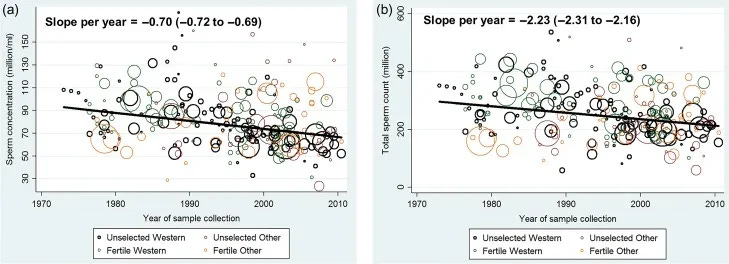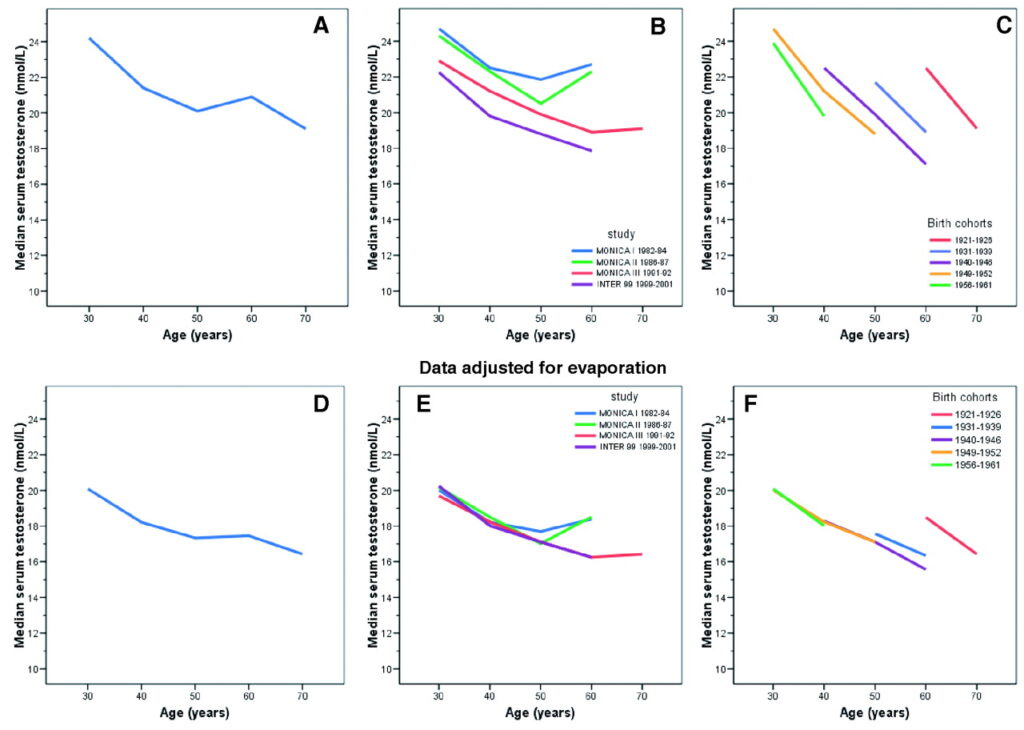It's not just sperm quality decline
The combined evidence for the decline of men
Recently Scott Alexander wrote a long piece in his usual fashion Declining Sperm Count: Much More Than You Wanted To Know. He takes the usual meta-skeptical rationalist approach of reviewing the best studies and trying to think of reasons they might be wrong. It's easy to attack the meta-analysis of studies for sperm quality decline because it looks like this:
One thing he didn't consider, though, is related evidence. And there is such evidence. Think of manliness overall. Men produce sperm, yes, and the same balls also produce testosterone. So if there's something more generally wrong with balls, might there be a decline in testosterone too? We know there is:
Design and Setting: Testosterone and SHBG were analyzed in 5350 male serum samples from four large Danish population surveys conducted in 1982–1983, 1986–1987, 1991–1992, and 1999–2001. Free testosterone levels were calculated. The effects of age, year of birth, and time period on hormone levels were estimated in a general linear statistical model.
Main Outcome Measures: Testosterone, SHBG, and calculated free testosterone levels in Danish men in relation to age, study period, and year of birth were measured.
Results: Serum testosterone levels decreased and SHBG levels increased with increasing age. In addition to this expected age effect, significant secular trends in testosterone and SHBG serum levels were observed in age-matched men with lower levels in the more recently born/studied men. No significant age-independent effect was observed for free testosterone. Adjustment for a concurrent secular increase in body mass index reduced the observed cohort/period-related changes in testosterone, which no longer were significant. The observed cohort/period-related changes in SHBG levels remained significant after adjustment for body mass index.
Conclusions: The observed age-independent changes in SHBG and testosterone may be explained by an initial change in SHBG levels, which subsequently lead to adjustment of testosterone at a lower level to sustain free testosterone levels.
The men are from different birth cohorts and they have been measured repeatedly as they aged. There's large and obvious declines to be seen. Might this also be reflected in declining masculinity? I mean, if testosterone makes men men, and testosterone is declining, we should have less manly men now. And we do insofar as self-report is concerned:
This evidence is less impressive once one sees that women are also declining in femininity, which suggests a common cause, maybe gender ideology's increasing prevalence. These data are also cross-sectional, so it's possible that these differences are just due to aging. Not very likely though. Alternatively, we can speculate that the reason women increasingly consider themselves less feminine is that this is by comparison with men who are less masculine. It stands to reason that as men become less masculine, the sex difference in masculinity declines, thus making women relatively more feminine. So one could still consider the female results caused by male decline in masculinity, not a true decline in femininity per se.
There is also some data on physical measures of masculinity, e.g. hand grip strength:
The study is not impressive because it's based on a relatively small sample of Italians who were compared to an older cohort. And the women showed a decline too:
Thus, one might just posit a general decline in physical labor as the cause. There's also this more impressive study of the large SHARE cohorts, and it doesn't find anything super consistent for hand grip strength, as two countries showed a nonlinear decline (Germany, Spain) and one country didn't (Sweden). The sample appears to be quite age restricted, so maybe they just missed it. Evidence inconclusive but worth looking at in more datasets. SHARE has 28 countries, the authors say "we chose Germany, Sweden and Spain, as all three countries had similar sampling frames and recruited refreshment samples in roughly the same waves", but this might just be academic bullshit for being too lazy to look at all the countries. The data appear to be public, so set loose!
Aside from these manliness indicators, we can also look at the opposite angle: dysfunctionality of the testicles. It stands to reason that if something is causing a testosterone decline as an environmental factor -- and it must be an environmental factor because genetic selection is favoring manliness -- there might be other things wrong with them too. What about testicular cancer rates? Yes, they are also increasing (2013 review):
Background
Testicular cancer is a rare tumor type accounting for 1% of malignancies in men. It is, however, the most common cancer in young men in Western populations. The incidence of testicular cancer is increasing globally, although a decline in mortality rates has been reported in Western countries. It is important to identify whether the variations in trends observed between populations are linked to genetic or environmental factors.
Methods
Age-standardized incidence rates and age-standardized mortality rates for testicular cancer were obtained for men of all ages in ten countries from the Americas, Asia, Europe, and Oceania using the Cancer Incidence in Five Continents (CI5plus) and World Health Organization (WHO) mortality databases. The annual percent change was calculated using Joinpoint regression to assess temporal changes between geographical regions.
Results
Testicular cancer age-standardized incidence rates are highest in New Zealand (7.8), UK (6.3), Australia (6.1), Sweden (5.6), USA (5.2), Poland (4.9), and Spain (3.8) per 100,000 men. India, China, and Colombia had the lowest incidence (0.5, 1.3, and 2.2, respectively) per 100,000 men. The annual percent changes for overall testicular cancer incidence significantly increased in the European countries Sweden 2.4%, (2.2; 2.6); UK 2.9%, (2.2; 3.6); and Spain 5.0%, (1.7; 8.4), Australia 3.0%, (2.2; 3.7), and China 3.5%, (1.9; 5.1). India had the lowest overall testicular cancer incidence −1.7%, (−2.5; −0.8). Annual percent changes for overall testicular cancer mortality rates were decreasing in all study populations, with the greatest decline observed in Sweden −4.2%, (−4.8; −3.6) and China −4.9%, (−6.5; −3.3).
Conclusion
Testicular cancer is increasing in incidence in many countries; however, mortality rates remain low and most men are cured. An understanding of the risks and long-term side effects of treatment are important in managing men with this disease.
So there we have it:
Sperm quality is declining
Self-rated masculinity is declining
Maaaybe hand grip strength is declining
Testicular cancer is increasing
And of course, male social power compared to women is on the decline
Each part of the evidence isn't airtight but it is certain that there is something very wrong going on with men. Weirdly, the best hypothesis I know of is heat stress, so maybe the cause is adoption of tight western clothing that causes overheating of the balls. Jeans date from 1870s but really pants for men are thousands of years old. I would have to have been used less commonly for this model to fit. Also, heat stress shouldn't really be able to cause successfully lower testosterone in men, it's not a cumulative effect. Also, I admit it is hard to believe heat stress could cause cancer but who knows. Maybe what we need is some religious cult that just happens to adopt male dresses as fashion so we can compare. Maybe this exists somewhere. Unfortunately, it doesn't appear the Amish can help us out there. Better heating of houses is another potential cause of heat stress, but again does not seem to offer any cumulative explanation, so we would have to posit increasingly improved heating over the last 100 years. Is that really the case? Hot showers being more frequent? In-door labor? Sitting labor? Maybe if one took all the heat stress factors together they would add up to a continuously increasing rate of stress that fits.
I don't really have any other good ideas aside from positing nefarious environmental toxins, which is never a good starting point. Everybody can point to things like reduced fighting among boys and men, resulting in some biological trigger for "peace time" so as to cause lower testosterone production, but really, which is the cause and the effect here? Reduced fighting might as well be the effect rather than the cause.







People are getting fatter and fat is estrogenic.
Disagree with most of the comments, but love all the ideas people are putting forward!
Going from most plausible to least plausible claims:
1. Lower T is one of the drivers of obesity, and lower T is caused by some mixture of obesogenic diets, declining physical activity, and pro-female cultural pressures.
2. The study on testicular suggests testicular cancer is most likely diet and hormone related. India has a notoriously low meat intake, and smaller, more effeminate, men. Lower T, lower growth hormone (lower heights), and probably lower IGF-1 (due to less meat) all contribute to their lack of testicular cancer.
3. Porn somehow decreases T levels by giving men depression, or through suppressing their effort in mate-seeking. The immunosuppression idea doesn't make sense to me as surely that would lead to more infections? Yet precisely the opposite has happened over time. In fact, declining infections has been speculated to be a driver of obesity, as less time fighting off infection generally means lower body temperatures, which means less energy expenditure in the form of heat.
4. The lobster man was right to recognise the significance of the pill in changing society. There's a few studies suggesting that some forms of female contraception decrease women's preferences for physical masculinity, and heightens their focus on other factors (What kind of dad will he be? What kind of job does he have? Is his family wealthy?). It is also possible that lower T for men might be somewhat correlated with income, since lower T probably makes you more likely to do better in school, and more capable of adapting to an increasingly feminine work environment.
So perhaps birth control has led to more men with a low T phenotype reproducing, due to them having better jobs (and wealthier families?) on average.
Tbh, I think people generally underrate the pill as an explanation for a lot of things. We are doing this massive experiment of putting lots exogenous sex hormones in women, and there is probably no free lunch there. For example, if you're a guy taking T for a long time, your body eventually loses its ability to create T itself, so you have to stay on it for life just to remain normal. Obviously, T has many behavioural effects too, so it seems probable to me that fucking with womens' hormones for years (especially during puberty) is going to cause some pretty significant changes.